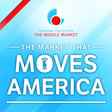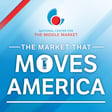Introduction to Middle Market Economy and IP
00:00:02
Speaker
Welcome to The Market That Moves America, a podcast from the National Center for the Middle Market. The center is the leading source of knowledge, leadership and innovative research on the middle market economy. Throughout our podcast, we will feature middle market leaders and stakeholders to hear their real world perspectives on trends and emerging issues.
00:00:22
Speaker
In our last episode, we introduced the importance of intellectual property for middle market companies. We continue that discussion in part two with a focus on trademarks.
Guests Introduction: Brian Wheelock and Joe Walsh
00:00:34
Speaker
Welcome to The Market That Moves America. I'm Doug Farin, managing director at The Ohio State University Fisher College of Business National Center for the Middle Market. We'd like to welcome you back to part two of a conversation that we started in our last episode.
00:00:50
Speaker
which was on intellectual property. And our guests were Brian Wheelock and Joe Walsh from Harness IP. I'm welcoming back Brian and Joe today. Thanks for joining me for part two of this conversation. We're going to continue talking about some other facets of intellectual property specifically at middle market companies.
Joe Walsh's IP Law Experience
00:01:14
Speaker
But maybe for the benefit of those who weren't able to hear our prior episode, first of all, welcome back to you both. And would you just mind sharing a little bit about your background experience and your role with harness IP?
00:01:27
Speaker
Sure, and thanks for having us back, Doug. So I'll start. My name is Joe Walsh, and I've been an IP lawyer now. And IP, for those of you who have heard the term or expression, but may not know what it means, it really covers patents, trademarks, copyrights, trade secrets, and related litigation and licensing. And that's what I've dedicated my legal career to.
00:01:48
Speaker
which is patents, trademarks, copyrights, related litigation, and licensing. I am a registered patent lawyer. I'm also a very active trademark lawyer and a copyright lawyer, as is my colleague and law partner, Brian Wheelock, and we've been law partners for over 25 years now, maybe 28.
Harness IP: A Century of Expertise
00:02:05
Speaker
So the overwhelming majority of our careers we spent together and we do a lot of work together with common clients. So Brian and I started the St. Louis Office of Harness IP, it's going on 22 years, it'll be 23 years this year.
00:02:21
Speaker
Our firm just celebrated its 102nd anniversary. So we're one of the oldest and largest intellectual property boutique firms. And what I mean by that is that's all we do is patents, trademark, copyrights, related litigation, and licensing. And we do it all over the world. So we have a team of dedicated associates in every industrialized country in the world where we help protect our clients' intellectual property in the US and using associates throughout the world.
00:02:48
Speaker
So that's my background, 36 years of experience. I'll turn it over to Brian. He's got a few more years of experience than me. Yeah. I have a similar career to Joe's in that I'm a licensed patent attorney, but I ended up doing just a little bit of everything in IP. And that's what I really enjoy is handling any aspect that comes along, solving the particularly hard problems. I also get a kick out of teaching IP. And I've been teaching law school for 20 years in addition to working
00:03:18
Speaker
full-time here at Harness IP. With about 40 years of practice under my belt, I think I'm well-versed in just about anything that's going to come along, but I would always like to be challenged. Yeah. Awesome. Well, it's great talking to you again and just again for a little bit of a recap on our last episode, we really introduced
00:03:44
Speaker
this topic, the broader topic of intellectual property as it relates to mid-sized company, which of course is our focus here at the NCMM. Some of the differentiation between things like copyrights and patents, and more importantly, why companies need to think about these things and why they're so critical. Today, I want to go into maybe a little bit different direction and focus on something that was brought up toward the end of our last conversation, which was,
00:04:14
Speaker
names and trademarks. So, you know, interestingly, a majority of the middle market, the privately held companies, a lot of B2B companies too, where, you know, maybe they think about their brand name or certain things that might not be as critical to more consumer facing types of companies. So let's just start there. Names and trademarks. What do you see when dealing specifically with mid-sized clients?
Why is Federal Trademark Registration Crucial?
00:04:42
Speaker
Mid-side clients usually seem to be reactionary in their activity. They start to get concerned about protecting their name or brand when they see a challenge or someone appears on the scene, where a little advanced preparation would have made a big difference. And I think if I was going to give advice to the collection of them, I think it's important to consider what you want your identity to be.
00:05:10
Speaker
Be intentional and conscious about what your identity is. Instead of being reactive, oh, you know, clients like that name or, you know, we never really thought much about it, or they like the, you know, our orange packaging. Now think in advance, what is going to distinguish you? How do you want to be distinguished and protect those aspects? And that goes from names and brand, you know, marks as well.
00:05:32
Speaker
So think about what the mark should be and how you want to protect it and then go about it. A lot of Joe and I were just talking about this the other day. You know, a lot of clients come to us and oh, yeah, no, don't worry. Don't, don't mess with our name. You know, we're a lawyer, you know, registered the name and it's all fine. Registering the name is your corporate name or is a fictitious name that doesn't protect the mark at all. In fact, a lot of the state forms tell you that if you look at them closely.
00:05:57
Speaker
You know, what we do is protect the name itself with either state or most likely the federal trademark registration that gives the company nationwide rights. And it's important to get those nationwide rights. The big advantage of getting that federal trademark registration, there are a bunch. The first is you get to use the cool little R in the circle symbol. So hey, this thing is registered, keep off. But the other thing it does is it reserves the mark throughout the country for
00:06:27
Speaker
ease of expansion. So if you get the registration, you're starting out and you've got the Midwest pretty well covered, but you're not using the mark in Maine or California yet, although you certainly plan to. If someone comes along and innocently adopts the mark and you don't have a registration, they'll end up owning it in those remote areas and you can only expand so far. But if you get the federal registration, anyone who comes along after the day you file, you know, is junior to you and you can kick them out.
00:06:57
Speaker
And so it's particularly important for a business that's starting up and growing or has hopes of expanding to get that
When to Choose State Over Federal Trademark Registration?
00:07:04
Speaker
reservation, right? The name is reserved throughout the country. If someone doesn't already have it, they're not going to get it. And that's the importance of registering your name as a trademark.
00:07:14
Speaker
So a trade game is a name that a business does business under, and it can also be their trademark, the name they put on products. And it could also be their service mark, which is the name they put on their services. Uh, and it's registration is, is the tool to get that. It's not very expensive to get. And the, you know, the rights it confers are well, are well worth it. If there's even a hint of a dispute. Yeah.
00:07:40
Speaker
So I've got a bunch I'd like to add as well, Doug, if it's a problem. Yeah, please. Okay, so I love trademark law. It's really interesting. Whenever we give a presentation, trademark law is what everybody pays most attention to. But there are a couple of rules that should be adhered to. Number one, if you are truly a small business operating in a small geography, for example,
00:08:02
Speaker
Like, you operate only in the state of Missouri or only
Proper Trademark Usage
00:08:06
Speaker
in the state of New York or only the state of Ohio. I recommend you get a state trademark registration, not a federal trademark registration. And this applies to people who run barber shops, landscaping businesses, catering services, things of that nature. They really have no plans to expand outside a three-city area or whatever.
00:08:27
Speaker
Don't spend the money to get a federal registration because then you have the obligation. The thing about trademarks is, unlike patents and copyrights, you can let people infringe your patents and copyrights without much consequence, you know, as long as you don't let them do it for more than six years. But with trademarks, if somebody's infringing your brand, you have an obligation to legally go after them and stop them. Otherwise, you lose your trademark rights.
00:08:53
Speaker
So, why bite off the United States if you know you're only going to use the brand locally? Get a state trademark registration. It's a lot cheaper. You only have to protect it in the area where you're actually operating. That applies probably to 10% of our clients. 90% are selling on the internet. They're selling on Amazon. They need federal protection.
00:09:13
Speaker
So it's very important for them to get the federal registration. Let's talk about, Brian hinted about, he talked about trade names, trademarks. Tradenames are things, they're nouns, right? Trademarks are always adjectives. They modify the noun.
00:09:29
Speaker
And a lot of our clients don't get this. They think that you can just protect, you know, a slogan or a term in the abstract, you know, just, and then use it in text. No, that is antithetical to trademark use. So, you know, just do it, Nike. They have that as an expression. Let's build something together. I think it's Lowe's has that as an expression. And then you have, you know, a whole host of trademarks out there, but they're always used. It's Adidas brand sneakers.
00:09:58
Speaker
tied brand dish detergent. If you can insert the term brand between the mark and the noun, the thing, you're using the brand correctly. If you're using the brand as a noun, buy my Adidas, buy my Nikes, that's incorrect trademark usage and it'll blow up in your face ultimately because
00:10:16
Speaker
You know, you go to assert your rights against somebody and they say, hey, you're not using it as an indicator or source. You're using it as a thing, you know, as a common thing or as a descriptive term. So how you use your trademarks is really important. Now, let's go back. Let's wind the clock back a little bit. What are trademarks? Trademarks are adjectives, as we said. They can be it can be a logo. It can be a design.
00:10:40
Speaker
It can be a word, it can be a phrase, it can be a sound. NBC's bing, bing, bing, you know, the three... That is a registered trademark, you know. So you're in the kitchen washing the dishes, you hear bing, bing, bing on the TV, you know you're tuned to NBC, right? And Brian brought this one to my attention. There is a brand of knitting yarn that smells like plumeria blossoms.
00:11:07
Speaker
So you walk into a yarn store and you just follow your nose to the plumeria blossom scent and it'll take you to this one brand of yarn. So really a trademark can be anything that identifies products or services from a single source. That's the key.
00:11:27
Speaker
And it's really key because if McDonald's didn't protect its McDonald's brand for the Big Mac and everybody was using the Big Mac, you could not come to count on that same flavor when you bit into somebody else's Big Mac that you can count on when you bite into a McDonald's Big Mac.
00:11:46
Speaker
And that's really key because brands, you know, as consumers now, we buy stuff all the time on Amazon, right? Amazon's coming to your house. You like something like, you know, I like these clog footwear things, right? And I wear them all around my house, my yard. Well, I bought a few and they don't have any brands on them. And I want to buy them again because I like them so much, but there's no brand on it. So I don't know where to go, you know? So I'm gonna invariably wind up buying
00:12:15
Speaker
a different brand from somebody else because I can't go back to this guy. So brands are really important. And last week I was in New York visiting one of my nephews who owns a Christmas tree farm. And he showed me this really cool Christmas tree stand that has a peg up the center of the bottom of the stand. And he drills, when he sells his Christmas trees, he drills a hole in the base of the Christmas tree so that it can sit on that peg. And then when you screw the little screws together at the bottom, the tree stands perfectly straight.
00:12:44
Speaker
And I said, wow, that's a great tree stand. Tell me who makes that. And there was no brand on that. So there's a product that I would have gone out and bought had I known what the brand was, but now I'm not going to get it, at least not get it from that producer. So brands identify products from a single source in the marketplace, and they allow customers to distinguish between different suppliers of products.
00:13:11
Speaker
So there's a whole lot of trademarks. It's a lot of fun, but basically what they do, and they have to do this, they have to do two things in order to continue to be a trademark.
How Trademarks Help Consumer Identification
00:13:20
Speaker
And that's why Kleenex and Xerox are in trouble now because people are saying, give me a Kleenex when really what they mean is a facial tissue. Give me a Xerox when what they really mean is a photocopy.
00:13:30
Speaker
But you know, in order to be a protectable trademark, it has to identify products or services from a single source and distinguish them from the competition. And it has to do both of those two things at all times. And if it fails to do one or the other, then it fails to function as a trademark. Yeah, we have a.
00:13:46
Speaker
There was a trademark issue near and dear to us here that was announced last year. So the university won a trademark for the word the. Right. I remember that. And, you know, it's, it's interesting because regionally we say OSU and it's, it's understood that you're talking about Ohio state, but there's also Oregon state and Oklahoma state.
00:14:07
Speaker
I think part of the argument was the use of that word and now we have that trademark to use for licensing and branding of apparel and goods and all types of things.
00:14:21
Speaker
So conversely, I'm sure you've had instances where maybe a client goes to file and maybe somebody else already has that trademark. Have you seen examples of that? Okay, I'm going to pop in here again, too, because I've got two really stellar examples. It was a point that I was going to make, but I said so much else that I forgot about this.
00:14:39
Speaker
Absolutely. There is a right way to go about adopting a brand. And the right way is not to sit around in a room and have six people talk about what they like and then say, OK, we're picking this one. Let's go protect it. The right way is to come up with several different options and then talk to someone like us and have us do some searching to gauge the availability of that.
00:15:03
Speaker
for the use that you intend. Now, I'm going to give you two examples, and these are both wealth advisors. I won't tell you their names, but wealth advisors came to me, and they've been in business for like five or six years. The one guy got a cease and desist letter from somebody in California saying, hey, he just learned that you're using our brand. He's been in business for six years. He's got a big sign up on his building that he spent 25,000 bucks for. Guess what? He's got to take it down. He's got to take it down.
00:15:30
Speaker
So because he went about it the wrong way. So he had to go back through a whole rebranding product. Think about all the clients that he developed over six years. And now he's gotta go back to those people and tell them, hey, I'm changing my name and my website's changing and all that stuff. What a bunch of heartburn and wasted expense.
00:15:48
Speaker
So this happens a lot. So now I got another guy who's also in the financial realm. But he's going about it the right way. He heard about the other guy, I think. And he's getting ready to put a big sign up on his building. And he said, hey, I thought maybe I should contact you first. And I said, good idea. So we're going to walk him through that process as well. But the key is, particularly today, when you're selling products all over the world,
00:16:12
Speaker
You know, you have to know who's out there. And if there's a competitor in the United States, common law rights count, as Brian pointed out. You know, in most other countries of the world, it's first to file. Whoever gets there first is the winner at the trademark office, not in the US.
00:16:28
Speaker
You can be sitting on a trademark registration that you've got and unless you get to the sixth year point, if you get to the year six and you file a certain document that now makes your registration incontestable, if you get that, then
Importance of Brand Due Diligence
00:16:40
Speaker
you're fine. You can't lose your registration because somebody else used the same mark earlier. But if you don't get to that six year part and somebody say three and a half years into your year, you're happy, you're thinking, oh, I got my brand registered and everything. Okay, three and a half years, somebody knocks on your door and says, hey,
00:16:57
Speaker
I can show I used it five years before you ever even filed your application. Guess what?
00:17:02
Speaker
You'll lose that registration. So don't do a search. Spend your money wisely. It's money well spent. And I know it's hard. I've had to counsel clients to move away from marks that they, as a group, fell in love with, but tell them they can't protect it. You're going to spend a lot of money and time. And the whole point of doing a search is to make the path clean and easy for you to move forward. And then now you have rights that you can absolutely protect and assert against other people without fear that
00:17:32
Speaker
Somebody's coming after you. Right. I think that one of the big mistakes that people make is they think of a mark and they fall in love with it before they call it. Right. And that's when really bad decisions are made. They hear, we'll get a search. There's some things that are pretty close. You might want to think, oh, no, this is it. This is the mark that's going to, you know, spill the money from the company. And they end up with disputes about the mark and trademark oppositions in the trademark office and the lawsuit in federal court.
00:17:59
Speaker
And it's because they were too attached to the mark before they found out that the mark was available. And, and I'm going to say, you know, this is just a matter of ignorance. It's not a matter of conscious disregard, but a lot of business lawyers don't really understand trademarks. So when a client comes at him and says, I want to start a new company, here's the name. And he runs off and as Brian pointed out, registers it with the Secretary of State in that state.
00:18:23
Speaker
He thinks it's protected now, and the client thinks it's protected, but it's not. That's simply a trade name, a noun registration, which enables the state to collect tax from you. And if you hurt anybody in another state, they know where to find you and all that kind of stuff. It's a simple registration process. And the secretary of states, what they will do is they will register the same darn marks if they're one letter apart, or one word apart.
00:18:48
Speaker
They'll register them because it's not a prosecution system. They're not trying to determine whether there's any likelihood of confusion. It's just whether they're identical or not. And that is a completely separate matter from protecting a brand or protecting a trademark. Registering a trade name is not the same as protecting a trademark. And I'll get that. So what I'm hearing the takeaway here is
00:19:15
Speaker
Doing that little bit of due diligence upfront before you fall in love and having a couple options available is well worth the time to avoid headaches down the road. Absolutely. So when is the right time to have that conversation? Is it when like at first ideation or when that conversation is happening within the company? As early as possible. As early as possible. Okay. Got it. And then let's say you have clients that
Assessing Trademark Infringement Severity
00:19:46
Speaker
discover that their trademark is being infringed upon. I mean, what do you do from there? What level of involvement do they have? And how do you go about protecting that registration? Well, the client has to decide, is this really a problem? A lot of people get pretty proprietary about their marks. If the mark's being used in an entirely different business and in a remote area, maybe it's better not to worry about it because
00:20:16
Speaker
consumers are pretty savvy and they can distinguish between the same brand being used on entirely different products. And so if you get too proprietary, you'll spend all your time and effort and worry trying to enforce rights. But if it is something that's an area of natural expansion or it is in our
00:20:36
Speaker
or it's a competitive product or their substitutes, then you need to go after it. If you let one person in, then how do you stop anyone else? So if you let someone have a confusingly similar mark, then your mark isn't that distinctive anymore, and then another can come in with another slightly different mark.
00:20:56
Speaker
It goes back down to what I said about trademarks, right? They need to do two things They need to do those two things at all times identify your product or service in the marketplace and distinguish it from the competition if they if you allow as Brian said if you allow number two in and he's got just a letter different than your brand he uses an uppercase e instead of a lowercase e or uses a
00:21:19
Speaker
you instead of an E, and he's got the same products or whatever, and you let him in, you've opened the door to three, four, five, whatever, and that just dilutes the value of your brand and maybe actually kill your brand over time. But I will say, the question you asked initially is, you got salespeople out in the field, right? And as Brian said, people get very selfish and guarded about, protective about their brands, and you get the salespeople out there and they come back to management and the company and they say, hey Bob, Bob, Bob, look what I found here.
00:21:47
Speaker
There's a company over here and they're doing something and it's similar to ours. You need to get our lawyers after those people and take care of them or whatever. Everybody gets whipped into a frenzy and next thing you know, there's a phone call and everybody's hot and blah, blah. You really need to be cool and calm about these analyses because you can blow a lot of cash for no reason whatsoever. With social media being what it is today, you have to really be worried about being the big bad wolf.
00:22:15
Speaker
So, you know, here it is, the big guy beating up the little guy and all that. If really they're not killing your, if they're not hurting your brand and if they're not hurting your sales, you know, you might think about just letting them go. That was going to be my follow up was, is it incumbent upon the company to prove that they've been damaged or just like basically there's a threat of being damaged?
00:22:38
Speaker
How do you distinguish between that? Yeah, that's a great question. And then a lot of people don't draw that distinction. The proof of damage will be presumed if the marks are similar. So you can get a court to say, hey, stop it. Two people can't be in the same space with the same mark.
00:22:55
Speaker
If you want money damages as compensation, then you're going to have to prove, yeah, we've lost something because the courts just don't hand it, despite what you may think of after reading the papers and the online news, courts don't just hand out money. But the damages generally presumed if the marks are the same and the goods are the same or closely related.
00:23:17
Speaker
Yeah, remember what you said earlier about damage, you know, they will hand out the money if you have a copyright, a successful copyright claim where your registration is infringed and you can access the statutory damages, but no statutory damages for trademarks.
Logos vs. Names in Trademarks
00:23:31
Speaker
So you have to prove money damages, which means you have to prove lost sales, you know, that you would have made those sales, they were diverted away to these guys because of the brand. And that's really hard to prove. So you get into a lot of disputes over damages.
00:23:47
Speaker
What type of mark do you see as being more important? A logo or a name? Or do they hold equal weight?
00:23:55
Speaker
It depends on what you're using. Logo, the words generally are stronger just because people can remember them. Particularly if the logo isn't a swoosh. Yeah, a swoosh or something. But if you remember Nike and you can ask for Nike, you can Google Nike. You can Google swoosh as well. You can try, but it doesn't come out as well.
00:24:18
Speaker
But that said, the Swoosh is highly valuable. They paid 70 bucks for that to a graphic designer back in the late 70s.
00:24:28
Speaker
time, they got an assignment of all rights from her. And I think I read just three or four years ago, they gave her like $750,000 worth of stock. Yeah, they felt bad with that much. They're both important. And it's, and it's really, you know, you, the company may fall in love. Oh, we love that logo. You know, the founder's daughter drew it or you know, they can fall in love with something. It doesn't make any difference if the customers don't, it doesn't resonate with the customers, because those are the things that an infringer is going to copy.
00:24:55
Speaker
We kind of want people to think, you know, this goes with their product or related or something and they're going to try to simulate it. So it's the mark to the important mark to protect or the marks that when they get copied, everyone in the company goes.
00:25:09
Speaker
Uh-oh, or holy crap, we gotta stop this nonsense. And you know what happens with colors too, Doug. People don't realize it, but color is protectable as a trademark.
Understanding Color Trademarks
00:25:21
Speaker
There are a lot of brands out there or a lot of companies that make things. We have a big client who makes all of their products in green.
00:25:30
Speaker
and we registered actually the color yellow, I think, for underground irrigation piping for one of our clients. You know, because usually irrigation piping is PVC, it's just white, it comes out extremely white, but you have to put a special pigment in there and it costs you more money to make it yellow. But there's no reason why everybody else has to make theirs yellow. So our guys, our clients are the only guys who can make yellow irrigation piping. And when you see it, you know, it comes from them.
00:25:59
Speaker
Yeah, there are lots of color marks that are pretty famous. Brown for UPS, the fuchsia color for T-Mobile, orange is a color that's the theme for Home Depot. Yeah, and the one that started it was Owen's Corning with the fiberglass, the pink fiberglass, because that's extruded, that's actually colorless. And so you have to impart a dye to it to make it pink, which costs more money. And they did it because they wanted all pink insulation to be known from Owen's Corning. Yeah, interesting.
00:26:28
Speaker
So I guess kind of to wrap up, I've heard a couple
Key Steps in Trademark Security and Maintenance
00:26:31
Speaker
things today. This has been really, really interesting. Mid-sized companies should start thinking about this as early as possible. They need to
00:26:40
Speaker
have options and not be necessarily wed to things until they have everything filed properly. Then should issues arise, try to maintain a sense of calmness and work with professionals like yourselves to figure this out and not get too bent out of shape. Would that be correct?
00:26:58
Speaker
I think that's absolutely accurate. One thing I would recommend to Doug is what we do, for our long-standing clients, we tell them typically, we're willing to meet with you twice a year for an hour. If you want us to come and talk to your people, we're happy to do that. You just pay our plane fare, but we won't charge you for our days, our hourly rate for our day of
00:27:20
Speaker
contribution to you. We'll go and talk about any question. I told you earlier about the one client that we had with the, they reconfigured their product so that they could make an adaptable part, the disposable part, that changed their business. And that was a two hour conference over lunch. So what I would recommend is for any company that's kind of struggling, a little feeling, a little amorphous about what are we going to do with IP,
00:27:44
Speaker
you know, bring in IP counsel and say, look guys, either, you know, we'll pay your airfare and you come out and chat with us or let's do a zoom call or whatever. And maybe say, we want to spend, we want 500 bucks of your time or whatever. And we're going to hit you with a couple of issues and we just want to get some feel.
00:28:01
Speaker
So, because people are always thinking, you know, let's not get the lawyers involved because they're so expensive and they're just going to, you know, mire us down. And well, I'll tell you what, we're really practical guys. We understand how important and expensive this stuff is. We're conscious of all that. So, and if you say, I want 500 bucks of your time, we'll give you everything you need and 500 bucks, just kind of a big overview. You tell us what the issues are. We'll tell you what direction to go in.
00:28:26
Speaker
So you can dictate how much time you want a lawyer to spend on something. It's not just open the spigot and let them go.
00:28:38
Speaker
Yeah, so if I was going to identify that getting trademarks or getting a strong trademark, it's kind of five steps. The first is that clearance. Know what's out there before you start using the mark. Then do get that registration as early as possible because it locks you in and locks everybody else out. Use the mark properly. There's certain rules.
00:29:00
Speaker
any lawyer would tell their client, follow these rules so you don't commit suicide. Adjectives, not nouns. Right, those types of things. I've always talked about the ACID test for use. ACID, A, you're using it as an adjective. C, you use it consistently. I, you identify it as a mark, little asterisk registered trademark or this is a trademark of active company. TM or SM. Or TM or SM or in the circle if you got that federal registration.
00:29:30
Speaker
and then the D in the asset is distinctive. Make the mark stand out. If you just treat it as a normal word, you're not showing your own mark, your own identity respect. Make it bold, make it colored, make it stand out so people know. That's the mark, right. So you use it properly. Then the last two, spend some money advertising the mark, not just the product.
00:29:51
Speaker
Look for advertising, look for the color brown, look for the... Texaco did the best job in the old days. Look for the star. Yeah, you can trust your car to the man who wears the star, is the slogan. Advertise the mark and then lastly strategically enforce it. Don't go after everybody. Go after the ones that you really should go after.
00:30:11
Speaker
because as Joe said, you let other people in the marketplace, then you can't stop it. Once you have one uninvited guest, you have a house full. Yeah, great advice. Well, hey, I'd like to thank you both again. Another really fascinating conversation. I know I learned quite a bit, specifically as we spent a lot of time in this discussion around trademarks. And I think a lot of the advice that you shared, you know, would be extremely helpful for middle market companies who might be
00:30:41
Speaker
struggling with this or thinking about their own kind of trademark and copyright and larger intellectual property issues. If any of our listeners would like to learn more about Harness IP, you can visit their website at harnessip.com. Brian, Joe, thanks again for joining me today. Thank you, Doug. Thanks for having us, Doug, and we're happy to join you anytime. Okay, great. Thank you, and everybody have a great day. All right, bye now. Bye.
00:31:09
Speaker
Thank you for listening to The Market That Moves America. Never miss a new episode by subscribing anywhere podcasts can be found. You can also subscribe to our email newsletter at middlemarketcenter.org.









